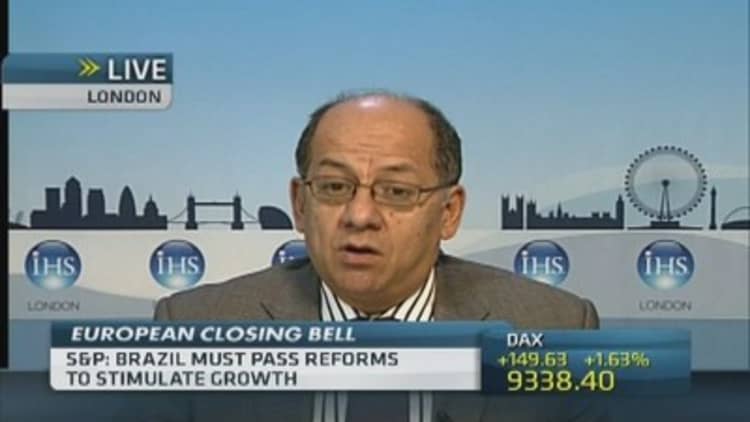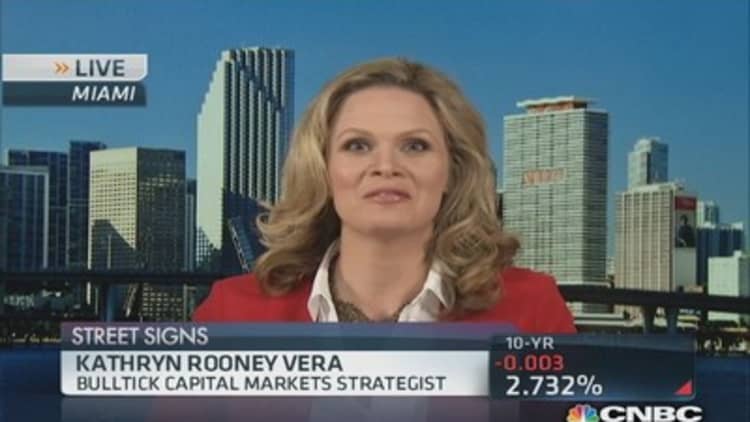Brazilian President Dilma Rousseff may be on course to secure a second term in October, but Brazil's credit rating downgrade this week could be a sign she is losing her grip on the country's finances.
(Read more: S&P cuts Brazil credit rating in blow to Rousseff)
The latest poll by Ibope showed Rousseff with 43 percent of the electorate's support. Yet on Monday, Standard & Poor's (S&P) downgraded Brazil's long-term debt rating to BBB minus, one notch above "junk" status. Brazil is rated BBB by Fitch and Baa2 by Moody's.
It is the latest blow to Rousseff who has struggled to revive the economy since the 2011 slowdown that has plagued her presidency since she succeeded Lula da Silva.
Regarding its decision, S&P wrote: "The downgrade reflects… the prospect that fiscal execution will remain weak amid subdued growth in the coming years," as well as "a constrained ability to adjust policy ahead of the October presidential elections".
Rousseff's first term: the verdict
The downgrade did not surprise analysts, as Rousseff has faced a difficult situation, with slowing economic growth coupled with a ballooning budget deficit and high inflation.
Carlos Caicedo, IHS senior principal analyst for Latin America, said Rousseff had tried to reverse these failing fortunes. "She introduced a number of tax cuts and the expectation was that they should have helped the economy," he told CNBC. "But it didn't. Fiscally, the country is in a weaker position."

The deficit has increased during Rousseff's reign from 2.6 percent of gross domestic product (GDP) in 2011 to 3.3 percent 2013.
Nomura's Head of Emerging Markets Americas Tony Volpon agreed the tax cuts had failed.
Brazil's economy grew 2.3 percent in 2013, compared to 0.9 percent growth in 2012 and 2.7 percent in 2011.
"Brazil...has now become a 2 percent-economy in terms of growth, and that has an impact on tax revenues," he told CNBC, arguing that Rousseff's expansion of public spending combined with a cut in taxes had badly affected the economy. Volpon said the policy did not work because Rousseff "gave the tax cuts to a few sectors of the economy, so she tried to pick winners, which is never a good idea."
Capital Economics Emerging Markets Economist David Rees argued: "It's all the wrong kind of spending. There's a lot of spending on wages and pensions. What they really need to do is rebalance and redirect it away from that kind of spending and get it into investment."
The times they are a-changin?
In a report in October, the IMF (International Monetary Fund) said Brazil needed to boost investment to assure sustainable growth. The report predicted that Brazil's investment rate would increase 18.4 percent in 2013, but would only edge up to 18.8 percent this year.

There was a consensus from analysts not only about a lack of investment, but that Brazil has not focused enough on making structural reforms.
The question is whether Rousseff will begin to implement reforms. Caicedo said he thought Rousseff "Will at least address the slippage of the fiscal accounts, to try to calm down the markets. "
However, Caicedo added: "There are certain structural reforms which are needed in Brazil that she is not going to do, such as pension, taxation and labor reforms."
Reese concurred that Rousseff would not make necessary changes before — or even after — the October election. "Coalition politics makes it difficult for her to put through the kind of unappealing reforms that are needed to reduce public sector wages and pensions," he said.
"She's certainly not going to do it ahead of an election and we're not convinced she's going to be able to do it after either. If that's the case, then Brazil is lining up for a pretty poor run."
Volpon was more positive: "I'm actually more optimistic. Brazil has always suffered from the political-business cycle, when governments don't make any hard decisions before the election and then afterwards they come in and clean up house. You will see that in 2015."

